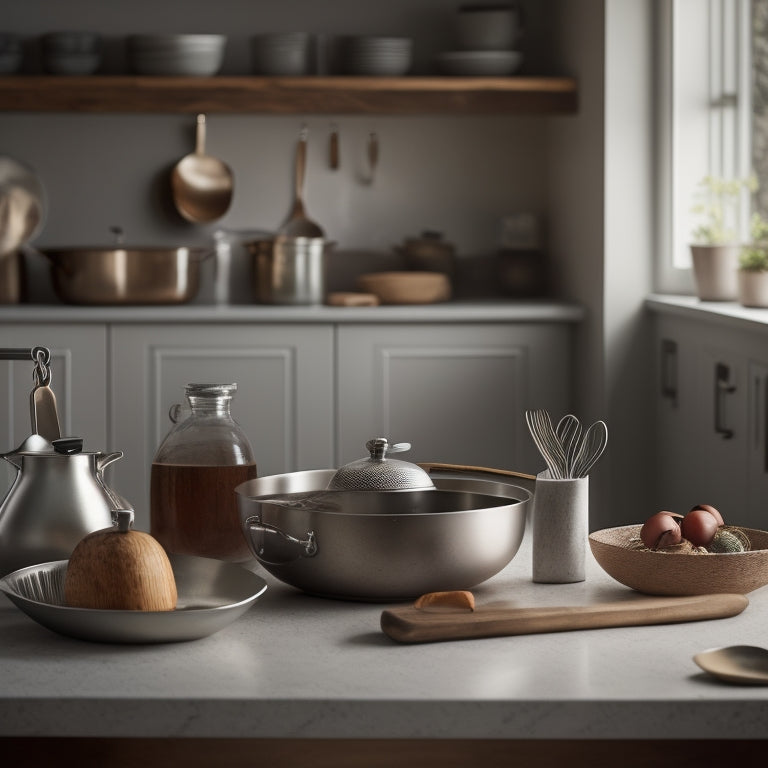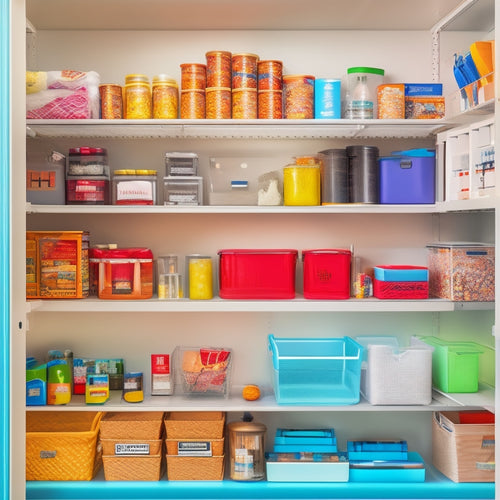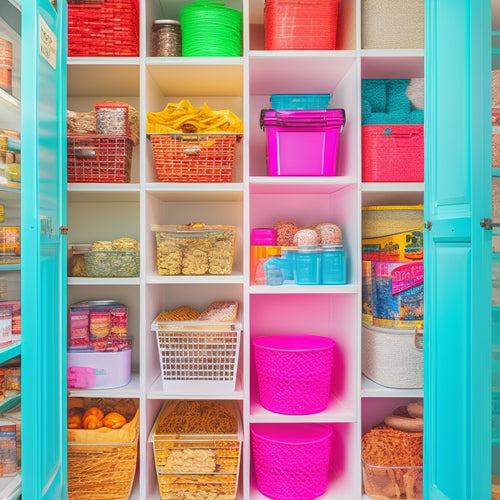
Clearing Clutter Clearing Mind: Kitchen Utensil Organization
Share
You know that feeling of overwhelm when you step into a cluttered kitchen? It's time to take control and clear the clutter. Start by sorting your utensils into keep, donate/sell, and discard piles. This simple step can help you gain a sense of clarity and feel the weight lifting off your shoulders. Cluttered countertops and disorganized drawers can delay meals and cause stress. By implementing organizational systems, you can create a haven of calm and focus on cooking rather than managing clutter. Now, get ready to transform your kitchen into a space that sparks joy and efficiency, and discover the secrets to a more peaceful you.
Key Takeaways
• Organize kitchen utensils to reduce stress, increase productivity, and create a sense of control and clarity in your daily routine.
• Assign a designated spot for each utensil, keeping countertops clutter-free and simplifying daily meal prep and cooking tasks.
• Identify and eliminate unnecessary utensils, acknowledging emotional attachment and cognitive load contributing to clutter.
• Implement mindful cooking practices to release emotional attachment to utensils and focus on the joy of cooking.
• Transform your kitchen into a space that sparks joy and efficiency by categorizing utensils, practicing mindful cooking, and assigning a home for each item.
Decluttering for Mental Clarity
Start by clearing everything out of your kitchen utensil drawers and cabinets, and sort items into three piles: keep, donate/sell, and discard, to give yourself a sense of control and clarity. This initial step will help you see what you have, what you need, and what's holding you back.
As you declutter, you'll begin to notice the weight lifting off your shoulders, and your mind will start to feel clearer.
Creating mindful spaces in your kitchen is essential for inner peace. When your surroundings are organized, your thoughts become more organized too. You'll feel more focused, and your cooking experiences will become more enjoyable.
Imagine being able to find what you need in seconds, having enough counter space to prepare meals, and feeling a sense of calm as you cook.
Kitchen Utensil Overwhelm Syndrome
You know the feeling: you're trying to cook a meal, but your cluttered countertops are causing you stress.
Every day, it seems like your utensil piles grow, making it harder to find what you need.
And when you do finally locate that one spoon, you're left wondering why your disorganized drawers always seem to delay your meals.
Cluttered Countertops Cause Stress
How does the sight of cluttered countertops, overflowing with kitchen utensils, make you feel? Probably overwhelmed, anxious, and stressed. You're not alone. Cluttered countertops can evoke countertop anxiety, making you feel like your kitchen is spinning out of control.
The kitchen, meant to be a haven for nourishment and connection, becomes a source of kitchen overload. Every time you enter the room, you're hit with a wave of anxiety, making it difficult to focus on meal prep or cooking.
The cluttered countertops can also make you feel like a failure, like you're unable to manage your kitchen space. This stress can seep into other areas of your life, affecting your mood, relationships, and overall well-being.
It's time to acknowledge the emotional toll of cluttered countertops and take control. By implementing organizational systems and strategies, you can transform your kitchen from a source of stress to a haven of calm and productivity. You deserve to feel a sense of belonging and peace in your kitchen.
It's time to clear the clutter and clear your mind.
Utensil Piles Grow Daily
Every day, kitchen utensils seem to multiply, piling up on countertops and overflowing from drawers, making it impossible to find what you need when you need it. You're not alone in this struggle.
It's easy to get caught up in the morning rush, grabbing what you need on the go, and leaving the rest to clutter your kitchen. But, this daily habit of neglecting your utensils can lead to Kitchen Utensil Overwhelm Syndrome.
As the piles grow, so does your stress level. You start to feel like you're drowning in a sea of spatulas, whisks, and wooden spoons.
It's time to break the cycle and take control of your kitchen. Start by implementing daily habits that promote organization, like putting away utensils after each use or designating a specific spot for frequently used items. By doing so, you'll create a sense of belonging in your kitchen, where everything has its place, and you can focus on cooking up a storm.
Take the first step today, and watch your utensil piles shrink, one habit at a time.
Disorganized Drawers Delay Meals
Cluttered drawers hide utensils, making meal prep a frustrating search-and-rescue mission that delays dinner and tests your patience. You're not alone in this struggle. Disorganized drawers are a common symptom of Kitchen Utensil Overwhelm Syndrome, and they can turn cooking into a chore.
When you can't find what you need, meal prep frustration sets in. You start to feel like you're wasting time and energy searching for that one spoon or spatula. This leads to delayed meals, which can disrupt your entire day.
Here are three ways disorganized drawers impact your cooking experience:
-
Increased stress: Searching for utensils can be overwhelming, causing you to feel anxious and stressed.
-
Wasted time: You spend more time searching for utensils than actually cooking, which delays meal prep.
-
Decreased motivation: Disorganization can make you less enthusiastic about cooking, leading to a decrease in meal prep frequency.
Hidden Dangers of Cluttered Kitchens
Hidden Dangers of Cluttered Kitchens
Grease spills and food residue on countertops can harbor bacteria, putting you at risk of foodborne illnesses. A cluttered kitchen is a breeding ground for hidden dangers that can affect your health, safety, and well-being.
| Hidden Danger | Consequence |
|---|---|
| Grease Buildup | Fire Hazards |
| Unsealed Food | Pest Infestations |
| Cluttered Counters | Tripping Hazards |
| Expired Food | Foodborne Illnesses |
| Faulty Appliances | Electric Shock |
You may not realize the risks lurking in your kitchen, but it's essential to take control of the clutter. Fire hazards, pest infestations, and tripping hazards are just a few of the dangers that can be prevented with a tidy kitchen. By keeping your kitchen organized, you're not only ensuring a more peaceful cooking experience, but also protecting yourself and your loved ones from potential harm. It's time to take action and create a safe and healthy kitchen environment.
Organizing Utensils for Calmness
Now that you've acknowledged the importance of a clutter-free kitchen, it's time to create a space that promotes calmness.
You'll achieve this by exploring utensil storage options that work for you, ensuring your countertops are clear of clutter, and simplifying your daily routine.
Utensil Storage Options
You'll find that assigning a designated spot for each utensil is key to maintaining a sense of calmness in the kitchen. This is where utensil storage options come into play. With a variety of options available, you can choose the ones that best fit your kitchen's unique needs and style.
Here are three popular utensil storage options worth exploring:
-
Utensil Baskets: These can be placed on countertops or hung from the wall, providing easy access to frequently used utensils.
-
Spice Carousels: These are perfect for storing spices, oils, and other condiments, keeping them organized and within reach.
-
Drawer Organizers: These can be customized to fit your kitchen's specific drawer sizes, keeping utensils and gadgets tidy and concealed.
Clutter-Free Countertops Now
By assigning a home for each utensil, you can keep your countertops clear of clutter, ensuring a sense of calmness every time you step into the kitchen. A clutter-free countertop isn't only visually appealing, but it also helps you stay focused and efficient while cooking.
To achieve this, start by categorizing your utensils into groups, such as baking, cooking, and prep tools. Then, designate a specific area or container for each group. This will create a sense of order and make it easier to find what you need when you need it.
Simplify Daily Routine
Having a system in place to organize your utensils streamlines your daily routine, freeing up mental energy to focus on meal prep and cooking. This, in turn, allows you to prioritize tasks and create a sense of calmness in the kitchen. By implementing a utensil organization system, you'll find that your morning routine becomes more efficient, giving you more time to focus on what matters most.
Here are three ways utensil organization simplifies your daily routine:
-
Reduces Decision Fatigue: With a clear system in place, you'll no longer spend precious time searching for the right utensil or deciding where to store it.
-
Streamlines Meal Prep: Organized utensils mean you can quickly grab what you need, making meal prep a breeze.
-
Saves Time: By having a designated spot for each utensil, you'll avoid wasting time searching for misplaced items.
Simplifying Kitchen Workflow Systems
Streamline your kitchen tasks by identifying and eliminating unnecessary steps in your workflow. This will allow you to focus on cooking rather than managing clutter. By doing so, you'll free up mental energy and reduce stress in the kitchen.
To get started, take a closer look at your daily cooking routine. Identify tasks that can be combined or simplified, and eliminate any redundant steps. For instance, consider prepping ingredients for multiple meals at once, or using a single utensil for multiple tasks.
The Psychology of Kitchen Clutter
You tend to hold onto kitchen utensils and gadgets because they evoke memories of special occasions or represent a sense of accomplishment in the kitchen. This emotional attachment makes it difficult to part with items, even if they're no longer serving a purpose. As a result, your kitchen becomes cluttered, and you're left feeling overwhelmed.
This emotional attachment is closely tied to cognitive load, which refers to the mental effort required to process and prioritize information. When your kitchen is cluttered, your brain is working overtime to navigate the chaos, making it harder to focus on cooking and enjoying the experience.
Here are three common ways emotional attachment and cognitive load contribute to kitchen clutter:
-
Sentimental value: You hold onto items because they remind you of happy memories or were gifts from loved ones.
-
Fear of missing out: You keep items 'just in case' you need them someday, even if you haven't used them in years.
-
Sense of accomplishment: You feel proud of your culinary skills and want to hold onto the tools that helped you achieve them.
From Chaos to Kitchen Zen
By acknowledging the emotional attachment and cognitive load that contribute to kitchen clutter, you're now ready to take the first step towards transforming your kitchen into a space that sparks joy and efficiency. It's time to shift your focus from chaos to kitchen zen.
Start by categorizing your kitchen utensils into three groups: keep, donate/sell, and discard. Be ruthless – if you haven't used it in the past year, it's likely taking up valuable space.
As you sort, practice mindful cooking by focusing on the sensations, smells, and textures of each item. This process is a form of kitchen therapy, allowing you to release emotional attachment and create a more intentional space.
Next, assign a home for each kept item, ensuring they're easily accessible and visually pleasing. Implement a 'one in, one out' policy to maintain your newfound organization.
Frequently Asked Questions
Can I Organize Kitchen Utensils Without Buying New Storage Containers?
You can definitely organize kitchen utensils without buying new storage containers. Repurpose containers you already have, like mason jars or old baskets, and get creative with DIY solutions to maximize your space and minimize clutter.
How Do I Decide Which Utensils to Keep and Which to Discard?
As you commence the utensil purge, beware the sentimental sirens singing sweet nothings of Emotional Attachment and Utensil History, then ask yourself: 'When was the last time I used this?'
Will a Utensil Organizer System Work in a Small Kitchen?
You can definitely make a utensil organizer system work in a small kitchen by opting for wall-mounted or compact designs that maximize vertical space and utilize efficient storage solutions, perfect for your cozy space.
Can I Involve My Family Members in the Kitchen Utensil Organization Process?
You can definitely involve your family members in the kitchen utensil organization process! Assign each person a specific task based on their strengths, fostering a sense of responsibility and teamwork, and encouraging collaboration to build strong family roles.
How Often Should I Maintain My Newly Organized Kitchen Utensil System?
"Settle into serene sustainability by sculpting daily habits, like tidying up after meals, and schedule seasonal refreshes to reassess your utensil arrangement, ensuring your system stays streamlined and stress-free, making you feel more connected to your kitchen haven."
Related Posts
-

Stockpile Essentials: Must-Have Items for Home
I keep my home stocked with essentials to avoid last-minute trips and guarantee smooth daily operations. I prioritize...
-

Newlyweds' Zola Registry: Top Picks Unveiled
Newlyweds can now effortlessly create their dream home with Zola's expertly curated registry picks. For a warm and in...
-

Revamp Your Pantry With Dollar Store Hacks
You can transform your pantry from a cluttered disaster zone to a sleek and functional space with just a few trips to...


